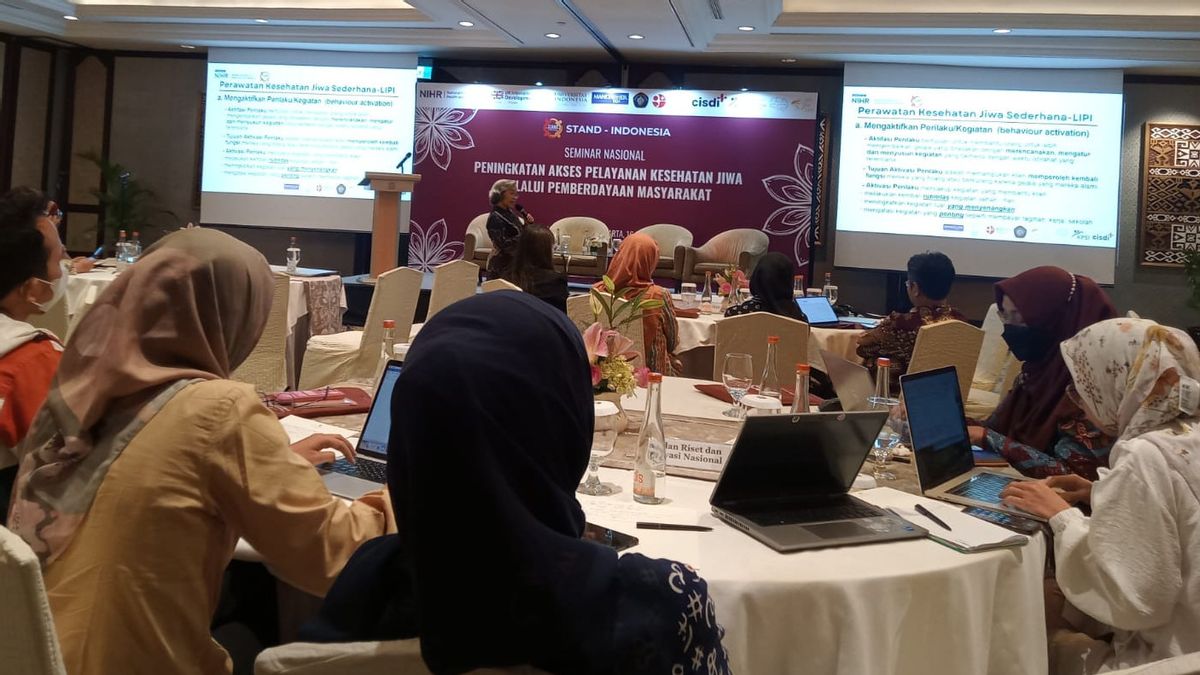JAKARTA - The Faculty of Nursing, University of Indonesia with The University of Manchester, the Indonesian National Research Agency (BRIN), Brawijaya University, and four organizations that focus on mental health (Into The Light, KPSI, Ubah Stigma, and CISDI) conducted collaborative research on the prevalence Mental disorders, especially anxiety and depression problems, have continued to increase since 2018.
Lecturer at the Faculty of Nursing, University of Indonesia (UI) and Head Researcher at STAND-Indonesia, Herni Susanti, explained that this research was to find a better solution to the problem of anxiety and depression in society.
"This research program is known as Sustainable Treatment for Anxiety and Depression in Indonesia, or abbreviated as STAND-Indonesia," explained Herni Susanti, in a written statement, Thursday, May 16 2024.
To provide a better solution to the problem of anxiety and depression in Indonesia, the STAND program has started in 2022 and is scheduled to end in 2026.
This research involved four provinces on the island of Java. Specifically, this research covers six urban areas and six rural areas in Tangerang City, Bogor Regency, and Semarang City, as well as Magelang Regency, Malang Regency, and Jombang Regency according to the Indonesian Central Statistics Agency (BPS).
The biggest polemic of the increasing rates of anxiety and depression in Indonesia is that of all individuals who experience these problems, only 9% receive treatment in health services.
"What we have to realize is that conditions of anxiety or depression can be helped, but on the other hand conditions of anxiety or depression can result in decreased productivity and even suicide if not treated," said Herni.
Until 2021, it is recorded that the number of professionals who can provide mental health care is still very minimal in Indonesia.
"Therefore, the focus of this research is to develop a simple mental health care model for individuals with anxiety and depression that can be provided by trained cadres," said Herni, explaining in detail.
This research was funded by NIHR Global Health Research for Sustainable Care for anxiety and depression in Indonesia (Award ID NIHR 134638) using international development funds from the UK Government to support global health research.
This research program includes 5 complex stages, so that apart from producing a treatment model for people with anxiety and depression, the research results can also be used as a database for Java Province.
In 2023, the first stage will be carried out, namely a household survey of 19,236 individuals from 4 provinces on the island of Java. The data obtained was that the depression rate was 4.42% and the anxiety rate was identified at 5.68%.
The prevalence of depression and/or anxiety in East Java (Malang and Jombang Regencies) shows a higher figure (8.79%), followed by Central Java (Semarang City and Magelang Regency) (7.86%). Other findings also included data from 1,480 people identified as experiencing depression and/or anxiety, only 338 people (22.9%) sought mental health treatment.
"The second stage was an interview study involving 140 participants, consisting of patients, families, religious leaders, community leaders, cadres, professional health workers and 27 national figure participants," she said.
STAND-Indonesia research team, Hasbullah Thabrany added, in 2024, the research team is actively carrying out the third and fourth stages of testing the Simple Mental Health Care Model in 4 provinces.
"The main aim of this research is to produce a community-based care model that can be provided to individuals who experience anxiety and depression. It is hoped that this model will provide better management for anxiety and depression, as well as being able to reduce the rate of worsening of the condition and prevent further psychiatric problems continue in society," she added.
This model is a form of community empowerment in overcoming anxiety and depression. Another benefit for the government is an analysis of the economic and social impacts that the government can use in constructing sustainable policies for overcoming mental health problems in Indonesia, especially in implementing the Simple Mental Health Care Model on a national scale.
"STAND-Indonesia also involves groups consisting of mental health activists, including survivors of anxiety and depression problems. They play an active role as facilitators and experts in various activities," she explained.
Apart from research activities, STAND-Indonesia is also committed to increasing the capacity of the general public and scientists in mental health. Through the STAND - Indonesia research program, it is hoped that concrete steps will emerge to increase public awareness and participation regarding mental health.
The English, Chinese, Japanese, Arabic, and French versions are automatically generated by the AI. So there may still be inaccuracies in translating, please always see Indonesian as our main language. (system supported by DigitalSiber.id)













